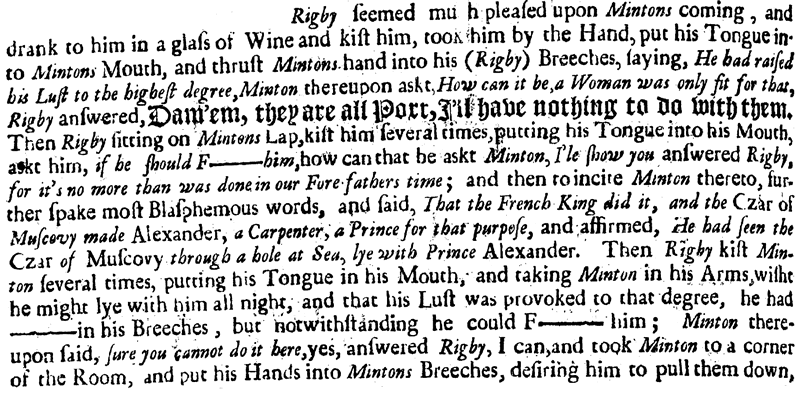June 15, 2006
The earliest typographically-bleeped F-word?
In response to my post on the history of typographical bleeping, Mark A. Matienzo sent in a reference to "An Account of the PROCEEDINGS against Capt Edward Rigby, At the Sessions of Goal Delivery, held at Justice-Hall in the Old-Bailey, on Wednesday the Seventh Day of December, 1698, for intending to Commit the Abominable SIN of SODOMY, on the Body of one William Minton", available from Early English Books Online (EEBO). This two-page document contains two examples of the F-word rendered by the initial letter followed by a horizontal line about three ems long, and one example (of what word?) rendered by a similar line with no orthographic clue.
I'd be surprised if this is really the earliest extant instance, but it's the earliest one that I've seen. Here's an image of the relevant section, fetched and cropped by me from the image on line at EEBO:

And here's a transcription of a bit more of the story, provided by Mark Matienzo:
... That about ſix a clock Minton came to the George Tavern, enquired for Number 4. and was ſhewed into the room where Rigby was, and the conſtable and his aſſiſtance were placed into a room adjoyning; Rigby ſeemed much pleaſed upon Mintons coming, and drank to him in a glaſs of Wine and kiſt him, took him by the Hand, put his Tongue into Mintons mouth, and thruſt Mintons hand into his (Rigby) Breeches, saying, He had raiſed his Lust to the higheſt degree, Minton thereupon askt, How can it be, a Woman was only fit for that, Rigby anſwered, Dam’em, they are all Port, I’ll have nothing to do with them. Then Rigby ſitting on Mintons Lap, kiſt him ſeveral times, putting his Tongue into his Mouth, askt him, if he ſhould F----- him, how can that be askt Minton, I’ll ſhow you anſwered Rigby, for it’s no more than was done in our Fore fathers time; and then to incite Minton thereto further ſpake moſt Blaſphemous words, and ſaid, That the French King did it, and the Czar of Muſcovy made Alexander, a Carpenter, a Prince for that purpoſe, and affirmed, He had ſeen the Czar of Muſcovy through a hole at Sea, lye with Prince Alexander. Then Rigby kiſt Minton ſeveral times, putting his Tongue in his Mouth, and taking Mintonin his arms, wiſht he might lye with him all night, and that his Luſt was provoked to that degree, he had ------ in his Breeches, but notwithſtanding he could F------ him; Minton thereupon ſaid, ſure you cannot do it here, yes, anſwered Rigby, I can and took Minton to a corner of the Room, and put his hands into Mintons Breeches, deſiring him to pull them down, who anſwered he would not, but he (Rigby) might do what he pleaſed; thereupon Rigby pulled down Mintons Breeches, turn’d away his ſhirt, put his Finger to Mintons Fundament, his hand behind him, and took hold of Rigbys Privy Member, and ſaid to Rigby; I have now diſcovered your baſe inclinations, I will expoſe you to the world, to put a ſtop to theſe Crimes; and thereupon Minton gave a ſtamp with his foot, and cry’d out Weſtminſter; then the Conſtable and his Aſſiſtance came into the Room, and ſeized Rigby ...
There's a piece of slang there that's completely new to me: "they are all Port". Not a good thing to be, apparently -- but why not?
[In the list of citations for the F-word given in the OED, it's written out in full in seven citations between 1503 and 1684, and then typographically bleeped in citations from 1707 to 1800. What happened between 1684 and 1698 to change the habits of printers? The Glorious Revolution? Or is this apparent trend just sampling error? ]
[Update -- with respect to the mysterious "they are all Port" passage, Karl Hagen, Gail Hapke and several others wrote in to suggest that the word is really "Poxt", i.e. afflicted with venereal disease. I believe that they're right -- I should have thought of that!]
[Update -- Jesse Sheidlower emails:
I see that HDAS's early bleeped example is from ca1650, cited from John Wardroper's Love and Drollery (a collection of 17th century pieces), but perhaps the piece is actually later, or there's some other explanation. (I don't have a copy here to see what it says.) In this case the entire word is dashed out, but it perfectly fits the sense, and rhymes with "luck" so I don't think there can be much doubt.
HDAS is the Historical Dictionary of American Slang.
To study the historical trajectory of typographical bleeping, the best data would probably be "G-d" and similar things involved in quoted oaths. It seems plausible to me that the socio-religious currents swirling around the English civil war, the restoration, and Glorious Revolution might have caused changes in typographical practice over the course of the 17th century, but that's just speculation. ]
Posted by Mark Liberman at June 15, 2006 07:54 PM